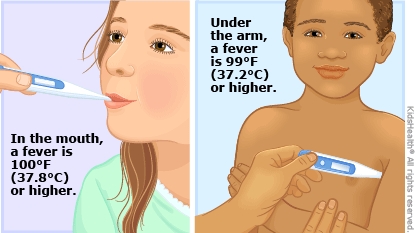Fever can seem frightening, but it isn't dangerous or bad for children. It can help the immune system fight infection. During the hospital stay, the health care team examined your child carefully. They may have done some tests to look for specific viral or bacterial infections. If your child was dehydrated, he or she may have gotten fluids through a vein (IV fluids). Your child may also have been given antibiotics while waiting for test results. The health care team did not find a serious cause for the fever, and your child is feeling better and can be cared for at home. But symptoms can change, so keep watching your child carefully.



Your child:

Your child:

What causes fever? In most cases, fever in a child is due to a viral infection (such as a cold or a stomach bug). But fever can also be caused by a bacterial infection, which needs antibiotics.
If my child feels warm, is it always fever? Not all kids who feel warm have a fever, so it's best to use a thermometer to measure their temperature if you have any concerns. Kids can feel warm when they are very active, play outdoors in hot weather, sleep in warm pajamas under blankets, or are upset and crying. These things make the skin feel hot because the skin is doing its job of getting rid of heat in the body.
What temperature is considered a fever? Temperatures taken in different ways can give different readings. You should know the number that is a fever for the type of measurement you are taking:
| Type of measurement | Where you take the temperature | When is the temperature a fever? |
| Oral | Mouth | 100°F (37.8°C) or greater |
| Temporal Artery | Forehead | 100.4°F (38.0°C) or greater |
| Ear | Ear | 100.4°F (38.0°C) or greater |
| Axillary | Armpit | 99°F (37.2°C) or greater |
Can a high fever damage my child? No. Only high body temperatures caused by heat coming from outside the body can cause damage (such as when a child is left in a hot car). A few children have seizures during a fever (febrile seizures). These are scary to see, but they do not cause brain damage or mean a child has a seizure disorder. Most kids who have febrile seizures grow out of them. High fevers don't necessarily mean an illness is serious or that antibiotics will be needed. How your child is feeling is more important than how high the fever is.
Does a fever always have to be treated? Not always. If your child seems well, is alert, is drinking, and is acting normally, there's no need to give medicine for fever. If your child seems cranky, tired, and uncomfortable, reducing the fever can help make your child feel better.